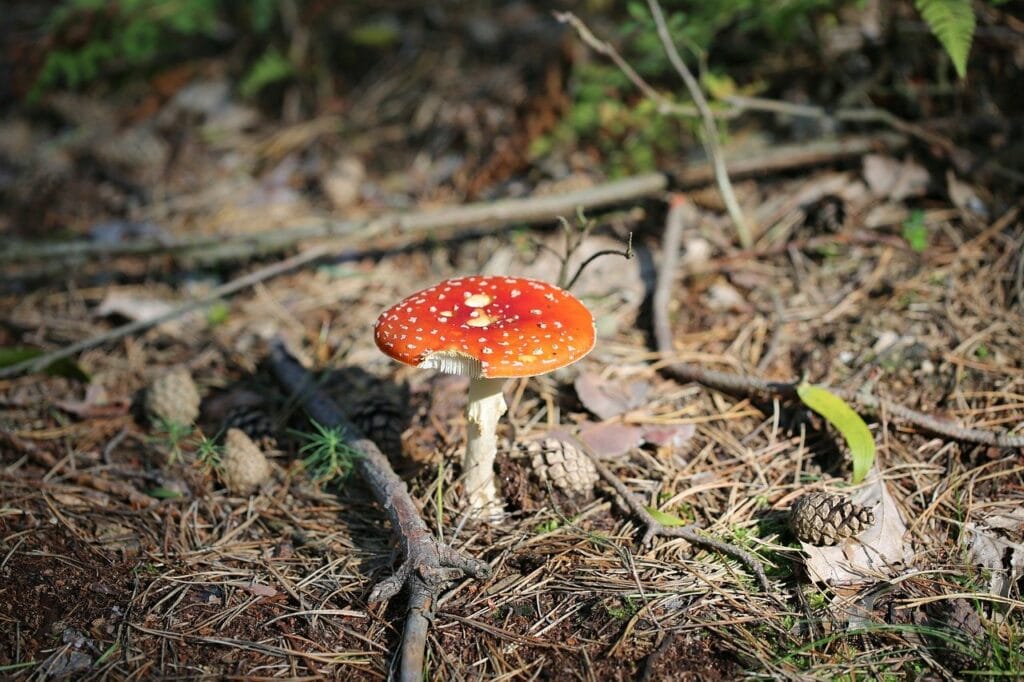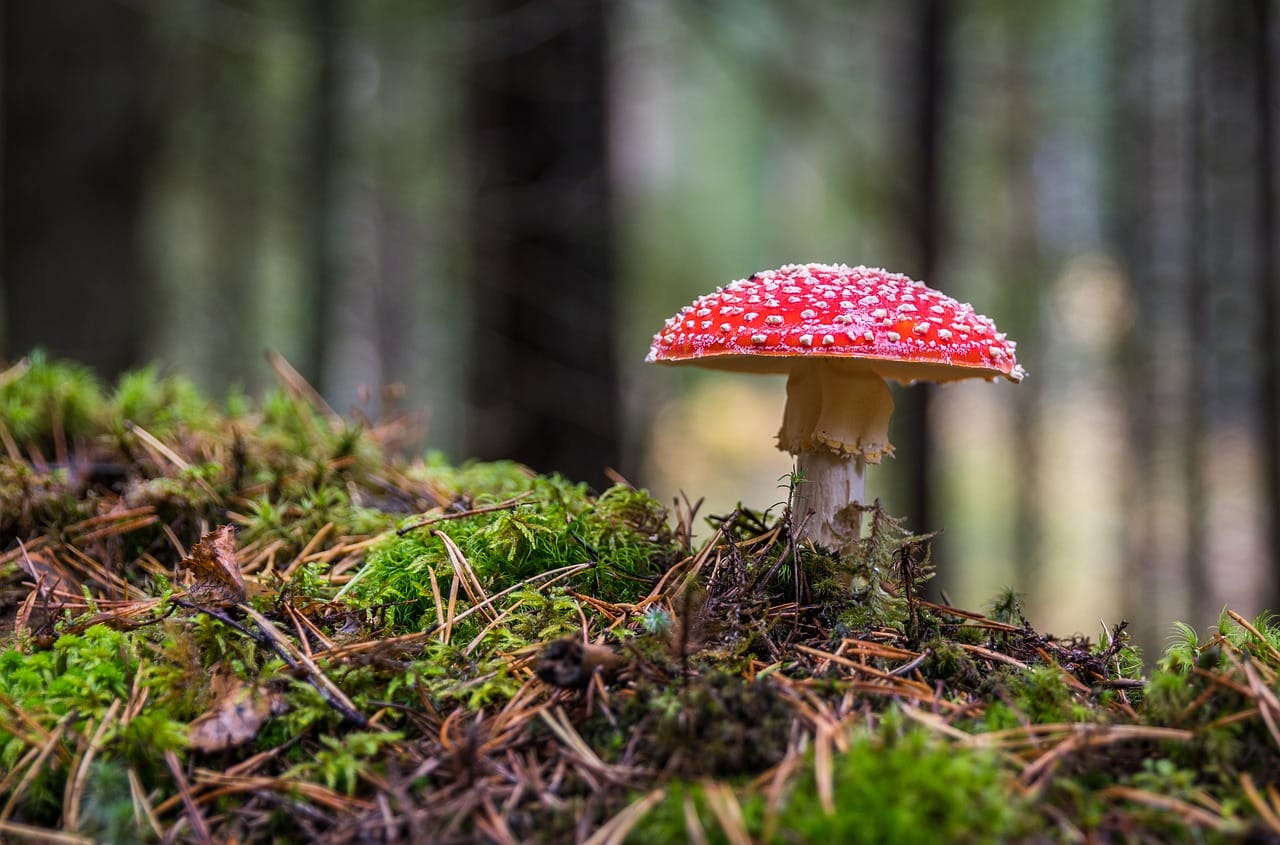Throughout millennia, mankind has observed and intentionally exploited the psychedelic properties of certain plants and fungi.
Among these, fungi, particularly magic mushrooms, are acknowledged as the primary natural provider of psychedelic compounds.
The psychedelic compound psilocybin, extracted from mushrooms, occupies a notable position in history for its usage in religious ceremonies and therapeutic practices.
A number of researchers are dedicating their efforts to explore the potential health benefits of shrooms online. Current research has shed light on the effects of psilocybin mushrooms, providing hope to many and sparking a conversation about the need to integrate them into Canada’s healthcare system.
Key Points:
- Magic mushrooms, containing the mind-altering compound psilocybin, offer several benefits to address mental health concerns in Canada.
- Psilocybin is safer and poses a lower risk of addiction and toxicity compared to opioids.
- Psilocybin demonstrates long-term effectiveness in treating depression, with effects that can persist for up to a year.

Understanding Psilocybin
Psilocybin is an indole-alkylamine (tryptamine) derived from magic mushrooms, which shares structural similarities with lysergic acid diethylamide (LSD). It induces hallucinogenic and euphoric experiences, likely due to its interaction with serotonin (5-HT) receptors in the central nervous system.
Given its interaction with serotonin receptors, high-quality magic mushrooms exhibit a unique capability to facilitate the management of mental health conditions.
Canada’s Mental Health and Opioid Crisis
Common Mental Health Disorders in Canada & Treatment Resistance
| 2012 | 2022 | |
| Major Depressive Episodes | 4.7% | 7.6% |
| Generalized anxiety disorder | 2.6% | 5.2% |
| Social phobia | 3.0% | 7.1% |
| Alcohol use disorder | 3.2% | 2.2% |
More than a third (36.6%) of people dealing with mood, anxiety, or substance use disorders reported unfulfilled or inadequately fulfilled healthcare and mental health needs.
An investigative piece from the Canadian Journal of Psychiatry shed light on the attitudes towards seeking treatment among patients with depression. The study examined 1282 patient records from 135 physicians. Two hundred and sixty-three patients were identified as having treatment-resistant depression (TRD), showing a prevalence rate of 21.7% across Canada.
Opioid Crisis
About 8 million Canadians, roughly one in five, experience chronic pain. Uncontrolled pain can negatively influence various aspects of a person’s life.
Healthcare providers often recommend the use of opioid medications for managing pain. While opioids can provide benefits such as relief from pain and improved functionality, they also carry potential risks.
From January 2016 to March 2022, at least 30,843 deaths related to opioid toxicity were recorded in Canada. Most of these unfortunate events happened in early 2021, with a staggering 5,368 cases reported. Importantly, over 88% of these incidents took place in British Columbia, Ontario, and Alberta.
For Major Depressive Episodes
In a study published in the Journal of Psychopharmacology, 27 individuals with a long history of depression were selected. Most of these individuals had suffered depressive symptoms for roughly two years before joining the study. 88% of these individuals had previously undergone treatment with conventional antidepressants, and 58% reported current use of such medications during their depressive episodes.
The investigators noted significant reductions in depression after psilocybin treatment for both groups. They also discovered that the severity of depression consistently stayed low at follow-up stages of one, three, six, and 12 months post-treatment.
For General Anxiety and Social Phobia
A case study published in the Croatian Medical Journal in October 2021 investigated HTML:
The story centres around a A solitary 16-year-old boy, grappling with severe anxiety, social isolation, and deteriorating academic performance, sought help from a mental health clinic. His struggles were exacerbated by a learning disability and a lack of motivation towards his studies, making group therapy an overwhelming and ineffective experience for him.
Remarkable positive transformations were observed after he underwent three psilocybin sessions over the course of 18 months. His anxiety significantly decreased and he was better equipped to communicate with his peers and teachers. He started articulating his feelings more openly, became an active participant in group therapy, and saw an improvement in his interpersonal relationships.
Addressing Alcohol Use Disorder
A recent clinical trial highlighted in a study published in JAMA Psychiatry on August 24, showcased the potential of integrating psilocybin with psychotherapy in treating alcohol use disorder. The researchers tracked the progress of 93 patients with this condition over a span of 32 weeks.
Of the individuals who participated in psilocybin-assisted therapy (48 in total), a striking 83% experienced a decrease in alcohol consumption within eight months of their initial dose, compared to a 51% reduction in the placebo group. Nearly half of the participants who received psilocybin ceased their alcohol consumption entirely.
The Opioid Crisis
Elena Argento, a postdoctoral fellow at the University of British Columbia and BC Centre on Substance Use, is conducting research on the medicinal applications of psychedelics.
Argento explains that psilocybin can reduce addiction risks by impacting both neurobiology and psychology. She underlines the transformative experiences that psychedelics can bring about, characterized by intense feelings of awe and self-transcendence. Such experiences can often help individuals discover new meanings and objectives in life, potentially instigating behavioral changes, especially in relation to addiction.
A recent longitudinal study spearheaded by Argento and the BC Centre on Substance Use revealed a significant reduction in the probability of persistent daily illicit opioid use among individuals who had recently or within the past six months used psychedelics.
Argento’s 2018 study also indicated that the use of psychedelics could act as a protective factor against the link between prescription opioid use and suicide risk.
A distinct study discovered links between psilocybin use and a lower likelihood of opioid use disorder. This prior research pointed to a 40% reduction in the risk of opioid misuse and a 27% lower risk associated with opioid dependence in those who had used psilocybin.
Psychedelic use has influenced the past year.
Health Canada and Other Regulatory Authorities Should Consider Psilocybin as Part of Canada’s Therapeutic Approach
While Psilocybin is recognized for its potential positive effect on Canadian mental health, obtaining it remains a challenge. Health Canada authorizes healthcare professionals to prescribe this treatment via the Special Access Program. However, the program’s stringent rules present a substantial hurdle for many professionals and patients.
The therapeutic use of psilocybin-infused mushrooms could revolutionize mental health care in Canada, offering potentially transformative benefits. Rather than depending on traditional, often less effective treatments such as pharmaceuticals or opioid substitute therapy, psilocybin therapy provides an alternative with potential for deep and lasting effects.
Research indicates that psilocybin therapy could provide long-term benefits, potentially saving patients substantial expenses on ineffective treatments. Additionally, studies suggest psilocybin is relatively safe, with low toxicity, minimal risk of misuse, and infrequent overdose occurrences.
Where Can Online Psilocybin Purchases be Made?
If Canadians struggle to access psilocybin therapy, they can opt to buy magic mushrooms online to improve their current conditions. They can discover a range of magic mushroom products, from high-dose shrooms to microdose magic mushrooms.
High-dose shrooms include psychedelic mushrooms available in different forms, such as dehydrated magic mushrooms, edible products, or beverages, which are consumed for their hallucinogenic and therapeutic properties.
Microdosing magic mushrooms refers to products containing minimal amounts of magic mushrooms. These products are available in capsules, shroom edibles, or shroom tea. Purchasing shrooms online offers an alternative way to experience the benefits of these mushrooms subtly. Magic Mushrooms Vancouver Canada exclusively sells premium magic mushrooms online, ensuring top quality.
Is Psilocybin a Good Fit for Canadian Healthcare?
Psilocybin is often misunderstood due to its recreational use. It’s vital to note that psilocybin has a safer profile compared to opioids and other drugs usually prescribed in healthcare environments.
An increasing amount of evidence suggests its potential benefits, similar to those of marijuana, in treating a variety of mental health disorders. dimensions of reality.
Magic mushrooms have historically been utilized in the wellness realm to bolster mental health therapies and facilitate personal development.
What potential risks and side effects do magic mushrooms carry?
Magic mushrooms can trigger diverse effects, both advantageous and detrimental. These may encompass hallucinations, modified perception, and psychological fluctuations. On the flip side, they could lead to nausea, vertigo, and in scarce instances, psychological distress. It’s crucial to use magic mushrooms prudently and respectfully, acknowledging the possible risks. Always seek advice from a healthcare expert before initiating any new routine involving magic mushrooms.
Is purchasing magic mushrooms online safe?
Purchasing magic mushrooms online can be secure if you opt for a trusted source. It’s vital to carry out extensive research about the product, brand, and online store before finalizing a purchase. Customer testimonials and ratings can provide valuable insights into product quality and the trustworthiness of the service. Always opt for online stores that prioritize customer safety and satisfaction and provide secure payment methods.
Is it feasible to cultivate my own magic mushrooms?
Indeed, home cultivation of magic mushrooms is feasible and can offer a rewarding experience. However, it necessitates specific environmental conditions and an in-depth comprehension of the cultivation process. Numerous kits and guides are available online to support your cultivation endeavor. Nevertheless, keep in mind that the legality of cultivating magic mushrooms varies by jurisdiction, so ensure compliance with your local laws and regulations.
experiences. In the wellness industry, some people opt for a more moderated approach, consuming smaller quantities of mushrooms to capitalize on their benefits without inducing hallucinations.Articles You Might Find Intriguing:





